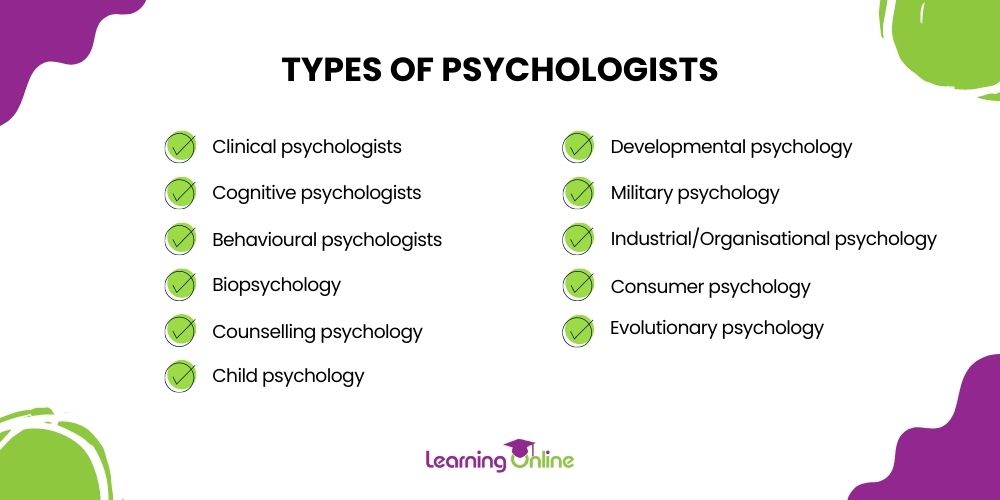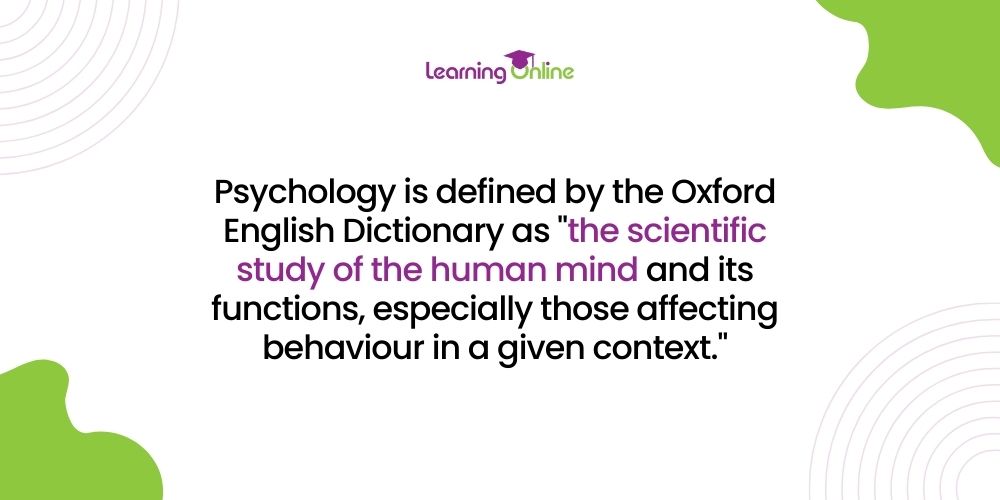Are you interested in the types of psychologists, or considering pursuing a career as a counselling psychologist? Fantastic, because that’s exactly what we’re here to talk about today!
Psychology is defined by Oxford Languages as ‘the scientific study of the human mind and its functions, especially those affecting behaviour in a given context.’ Human behaviour and psyche is incredibly complex, and while similar patterns and disorders can emerge in a collective, the make-up of every mind is entirely unique to each individual.
Luckily, there are many specialisms within the field of psychology which all focus on different areas of expertise, schools of thought, and which call on different tools and behavioural exercise to assist those in need.
We have compiled a list of the main types of psychologists, along with some details into more specific specialisms.
Types of Psychologists
Clinical psychologists
Clinical psychologists work to assess and support those suffering with various psychological difficulties, working with individuals as well as with teams and organisations. While a lot of psychological disorders can have a distressing mental impact, many can also manifest physically, sometimes without the patient being aware that their issues may be psychological. It is the job of a clinical psychologist to determine the root cause of a patient’s problems and advise upon the most effective course of treatment – this may be talking therapies, behavioural therapies, medication, and so on.
Cognitive psychologists
This string in the psychology bow looks at mental processes; the processing, holding and distorting of information and stimuli, memory, creativity, language processing, attention span, problem solving, perception, etc. The human mind is an extremely intricate tool, with new research and studies constantly astounding us as to its inner workings and processes.
Behavioural psychologists
Behavioural psychology looks into the reasons why we act the way we do, why our reactions are at times positive and other times negative, how we deal with certain emotions, coping mechanisms, addiction and obsessive compulsive behaviours, etc. One of the most widely used tools in many strands of psychology is Cognitive Behavioural Therapy (CBT), an exercise which links action and behaviour with mental processing and ways of thinking. This marrying of both the physical and the mental has proven to be extremely effective, particularly in cases of extreme phobias and Obsessive Compulsive Disorder (OCD).
Biopsychology
A deeper look into the science of the brain and body, how the physical inner workings of the human body can have a positive or negative effect on our psychology. Whether analysing synapses and neurotransmitters to deepen our understanding of the brain, or researching the links between physical and mental health, biopsychology helps us to understand how the make-up of our biology can affect our mental state.
There are also many other more focused psychology specialisms within the field, some of which include:
- Counselling psychology – helps to promote an overall sense of wellbeing by providing a safe space for people to talk through what is bothering them, as well as exploring the benefits of group therapies
- Child psychology – focuses on the psychological health of children, from prenatal to adolescence. These are vital developmental years in which we are extremely impressionable, and so it is more likely that we will be affected by things that we will then carry into adulthood
- Developmental psychology – looks at how humans grow and develop, from children through to adulthood, how our psychology and the way we experience the world changes at each stage of our lives
- Military psychology – supporting those in the armed forces who may be facing psychological and emotional difficulties
- Industrial/Organisational psychology – focuses on the workings of a workplace, such as how employees interact and communicate, what the environment is like and how it is run, as well as looking at ways to improve workplace performance and outcomes
- Consumer psychology – works to understand how the human mind influences the products and goods we buy
- Evolutionary psychology – works hand in hand with knowledge of biological evolution to better understand how humans have developed over time.
But how much do psychologists earn in Australia? I hear you ask. Well, our friends over at talent.com have a nifty salary search engine which gives you all the facts and figures of Australian psychology pay, giving you some insight into what you could make on a psychologist salary.
A considerable upside to becoming a psychologist is being able to choose whether to set up your own business or practice. Setting up your own practice can allow you to focus on your morals and values when it comes to helping those in need – how you work, tools and skill sets you call on, how you feel your work can best benefit the needs of your patients.
This also allows you to determine your own pay, setting up hourly rates for sessions that you feel your services are worth, whilst still keeping prices within the realms of affordability to ensure your services remain accessible to a range of clients and patients.

Considering a career in psychology?
Fascinated by human behaviour? Mesmerised by the power and intricacy of the mind? Want to make a difference to people’s lives through counselling?
Then you may want to check out our online Counselling Pathway course. This course is an excellent start for anyone wanting to enter a counselling career, or for anyone interested in learning the fundamentals, to then launch into further education in the counselling or therapy sectors.
It follows an entirely online course structure, giving you the flexibility to work your learning around your schedule and lifestyle. This 24/7 access to learning and total flexibility is what sets us apart from other study programs, and is the perfect choice for anyone who perhaps does not have the time or resources to commit to a full time degree course.
There is a downloadable course brochure available with more information on course content, accessing your learning online, tutor support and more. We also have course fee payment plans available to make the financial side of things that little bit easier.
We have a friendly team of course consultants on hand to answer any questions or queries you may have about this short course counselling pathway certificate, and to help direct you towards the best course for you.
And this is just the start! Our counselling pathway course could whet your appetite for further training into careers in psychology.
Why not follow up by looking into criminal psychology courses? Perhaps you want to know more about how our brains and behaviours grow and change as we get older, making developmental psychology your area of interest. Or maybe you like the sound of becoming a military psychologist, helping those in army positions maintain good mental health and offer a space for them to discuss the difficulties of their job.

The possibilities are endless, so dive into the world of counselling today and learn how YOU could make a difference.





